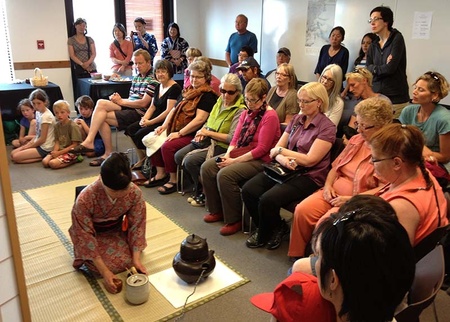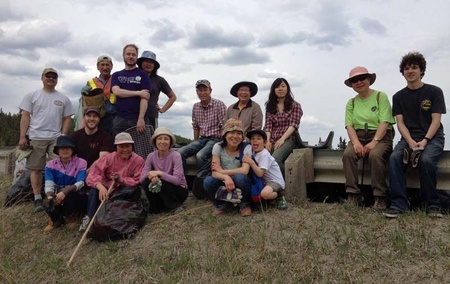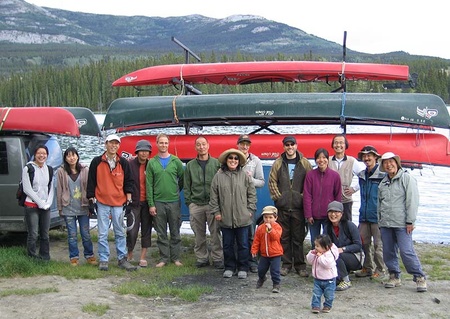Read Part 1 >>
Your group was involved in an extraordinary fundraising effort for the 3.11 tsunami and earthquake survivors.
In response to 3.11 Tohoku earthquake/tsunami disaster, the JCAY (Japanese Canadian Association of Yukon) had organized a Japanese Village Festival, and raised over $40,000 to donate to the Japanese Red Cross. The support from Whitehorse and the surrounding community for this event was simply overwhelming! This event served as a catalyst for our association; it fundamentally changed and helped to shape the nature of the organization. It certainly put JCAY on the map of the Whitehorse community at large.
What kind of events do you organize for the JC and wider community of Whitehorse?
Right from the time of formation of JCAY, we organized many cultural events, such as numerous Japanese Film Festivals, a Koto-Shakuhachi Concert, a Lecture-Demonstration of Noh Play, Tea ceremony demonstrations, and Bon-Odori folk dances, both for JCAY members and for the Whitehorse community at large. We generally have a pretty good-size audience, and sometimes a very good one. We receive a strong support from the local community.
JCAY has organized a series of three commemorative events to mark the 70th Anniversary of the Internment of Japanese Canadians and the 25th Anniversary of its Redress. To the last of the three we invited Roy Miki from Vancouver as a special guest. We feel that these events had a considerable positive effect in educating the Whitehorse community. But they only attracted a rather disappointing number of JCAY members. And this disappointment leads into the following discussion.
As a representative of JCAY, I’ve been deeply involved with activities of a group called Yukon Cultures Connect in Whitehorse to plan and organize many events to celebrate the multiculturalism, in which JCAY always participated actively. That same group played a significant role in persuading the City of Whitehorse to sign on to CCMARD (Canadian Coalition of Municipalities Against Racism and Discrimination) a couple of years ago. I now sit on the city’s Advisory Committee for CCMARD.
What are the important issues that you feel that Nikkei need to deal with in 2014?
I am convinced more and more strongly now that we cannot have a really meaningful discussion of this question of Nikkei without talking about racism and human rights. Indeed this is so important in this little northern city today. There has been a huge influx of new immigrants, of which only a small portion is Japanese, into Whitehorse in the recent five or six years alone; easily a few thousand people were added to the population of less than 30,000. The faces of people in town have changed dramatically; the ethnic and cultural diversity of the city these days is truly amazing.
What role can the Nikkei community play?
For Japanese Canadians, it is imperative to have a minimum knowledge of the Internment and the Redress before beginning to contemplate on what it means to be Nikkei. There is no denying that those two historic events helped to define the status that the Japanese Canadians in general enjoy today. The incredible amount of endurance and perseverance of Issei and Nisei during and after the Internment, and the wisdom, patience, and solidarity of the people who achieved the Redress cannot be over-praised.
Is there any guarantee, however, that the similar event like the Internment will never happen in Canada? I’m not so sure. In the wider world around us outside Canada, there have been far too many violent conflicts in a few recent decades, most of which were caused by racial, if not religious, animosity; some were escalated to become an all-out genocide. Is Canada immune to this kind of racial strife or overt racial discrimination in this day and age? Well, perhaps. At least not again in such a grotesque way as in the Internment of Japanese Canadians, or as in the Indian Residential Schools. But for me, it is not good enough. Things are happening all around the globe, and the world is getting smaller and smaller. No nations can possibly exist in a total isolation from the rest of the world. Take for example, the global problem of our environment is definitely affecting every country and every person wherever they live in the world. Global economic problems and political affairs are no different.
I believe Canada has a role to play: Canada is a uniquely multiracial and multicultural nation. We can become a model for other countries if we want to; we can show them how to co-exist peacefully with people of all kinds of different races, colours, beliefs, cultures, and languages. We must accept and respect each other’s differences. We must see each other purely as a person, and not through any stereotype images.
As the people who experienced the horrific cultural genocide 70 years ago, Japanese Canadians can show the true significance of the Redress within the context of Canadian democracy.
What is the value of being of Japanese descent for younger generations?
As I mentioned above, Japanese people in general have an enviable reputation in regards to their work ethics.
In Canada, in particular, it must be acknowledged that Japanese young people owe it to the Issei, Nisei, and the subsequent generations for having built that good reputation for us with much hard work. The appreciation and deep respect for what the generations before us have done for the present day Nikkei would be the first positive step in building a solid Nikkei community.
At the same time, we must be cognizant of a danger of the pitfall of being too boastful of our good reputation, so much so as to paint some other group or groups of people in a single brush stroke of over-generalization and stereotyping.
What kind of Canadian Nikkei identity do you want to see evolve and emerge in the future?
Being a proud Nikkei must make you more appreciative of the same kind of pride which people of other ethnic groups with a variety of cultural backgrounds hold for their own roots and identity, rather than trying to sit on a false sense of superiority and see others as inferior. Japanese Canadians as a group of people were all forced through a terrible experience 70 years ago. We were persecuted then. We must never allow any people to be treated like that. We must do our utmost to make certain that anything similar will not happen to any group of people in Canada. When Japanese Canadians speak on the issue, our words can have a special weight.
What are some Canadian issues of concern to your group now? How much of a concern are First Nations issues for you?
First Nations issues are the most important issues now among all the general, wider issues of racial discrimination. How to create a forum of meaningful discussions on these issues, inside JCAY, in the larger Nikkei community, and in the wider, multi-ethnic communities in Canada, is a difficult question we must keep asking to ourselves. When and if the Nikkei community speaks as one voice, we can exert a serious influence in Canada and lead the discussion into a positive direction.
© 2014 Norm Ibuki









